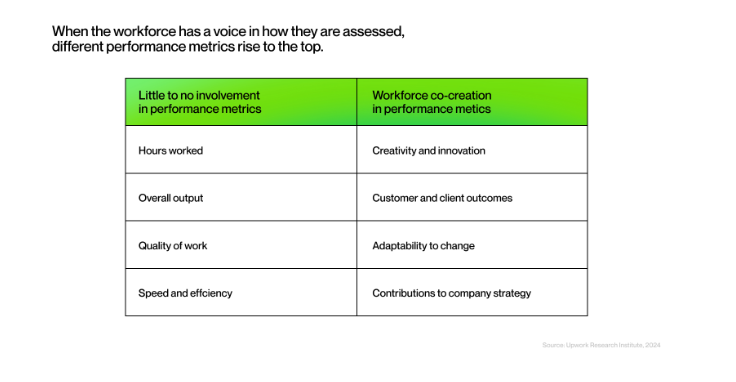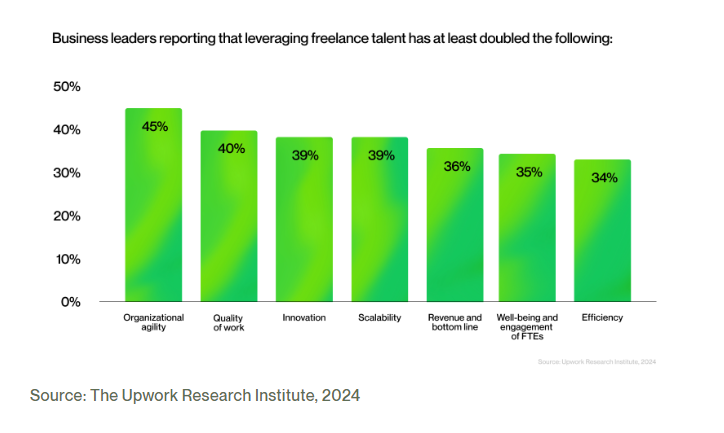AI creates more work for 77% of employees, says Upwork
It’s time to break free of the “narrative that AI is a straightforward path to efficiency”, the reality is more complex. UNLEASH unpacks the solutions with Upwork’s Research Director Kelly Monahan.
News In Brief
AI adoption alone won't solve your productivity challenges.
That's proved by new data from Upwork, which found that while the C-Suite and employees are excited about the potential of AI to drive productivity, the truth is that AI is actually adding to people's workloads.
With the help of The Upwork Research Institute's Managing Director, Kelly Monahan, UNLEASH unpicks the data and uncovers how to leverage AI to drive workplace productivity.
Employers are very optimistic about the potential of AI to drive productivity.
According to new research from freelancing platform Upwork, 96% of the C-Suite believe that AI will enhance productivity. While 65% of employees agree about the potential of AI, their day-to-day reality is quite different.
Upwork’s survey of 2,500 workers, including 1,250 C-Suite executives in the US, UK, Australia and Canada, 77% of workers said that AI had actually increased their workload and 47% said they didn’t know how to achieve the expected productivity with AI.
For Kelly Monahan, Managing Director of The Upwork Research Institute, this “stark contrast between the expectations of C-suite leaders and the actual experiences of employees regarding AI’s impact on productivity” was the most interesting finding of the report.
Speaking exclusively to UNLEASH, Monahan shares: “This disconnect highlights a significant gap between leadership optimism and the reality of AI integration at the employee level.”
The reasons why AI is challenging productivity is because employees had to spend more time reviewing and moderating AI generated content (39%), invest time in learning how to use the tools (23%) and were asked to do more work as a direct result of AI (21%).
Upwork’s data also showed that employees think their company is putting too much faith in AI to solve productivity problems.
One in four workers believe their company is asking too much when it comes to AI, and this push for productivity with AI is driving burnout (71%) and high attrition (one in three say they will quit their jobs in the next six months because of burnout and feeling overworked).
Burnout is higher for women (74% vs 68% of men), and for Gen Z (83%) and millennials (73%), according to Upwork’s data.
In addition, while 84% of C-Suite executives are adamant that the company values wellbeing over productivity, only six in ten employees agree.
Those employees that think the company values productivity over wellbeing are more likely to feel overwhelmed by their workload than those who believe their company prioritizes their wellbeing (73% vs 56%).
The issue is that leaders are pushing their workers to increase output (81%) with the hope that AI will fill the gap.
But only a quarter of companies said they have an AI training program, and 13% have a well-implemented AI strategy – without support, how are workers supposed to make the most of AI at work?
HR, here’s how to unlock productivity with AI
Upwork’s data breaks the “common narrative that AI is a straightforward path to efficiency”, according to Monahan.
This is “a wake-up call for business leaders…it underscores that introducing AI into outdated work models and systems is failing to unlock the full productivity potential of AI, creating more hurdles than solutions for employees”, explains Monahan.
There is a need for a “paradigm shift” for how organizations think about AI, states Monahan.
This mirrors calls by Slack’s SVP of Research Christina Janzer – “introducing the technology is not enough” to spur adoption or enable employee to use AI at work in the best way.
Yes, incremental changes like clear AI use guidelines, and more education training, can help, but, for Janzer and Slack, it’s time for AI work redesign.
This begs the question, what should this work redesign look like?
For Upwork and Monahan, there are three big changes to make.
The first is rather than mandating the use of AI at work (as 39% of respondents do), organizations need to create “a more collaborative and supportive environment that empowers employees to harness AI effectively”.
Currently, the C-Suite is overestimating worker AI readiness – 37% think that the workforce is highly skilled in AI, but actually only 17% of employees agree and 38% reported feeling overwhelmed from having to use AI at work.
Upwork’s data shows that employees will be more satisfied (81%) and productive (76%) if they felt they had a say in how productivity was measured in their workplace.
Three quarters believe that productivity needs an overhaul to move away from speed and efficiency to be more about strategy, creativity and innovation.

Source: The Upwork Research Institute, 2024.
Secondly, Upwork calls on employers to really embrace skills-first HR approaches.
Currently, executives are very clear on the skills they need (data analytics, generative AI content generation, and modelling and database development for example), but they are less good at figuring out what skills they actually have.
Currently, only one in four leaders have a high-level view of their workforce’s skills.
Organizations, and specifically HR teams, need to invest in training and development to upskill employees, and make sure they feel comfortable using AI in their work.
There is also a need, according to Monahan, for employers to facilitate a “growth mindset” around AI.
They need to “promote a culture where employees are encouraged to experiment with AI tools, learn from failures, and continuously improve their skills”, she tells UNLEASH.
This also echoes the perspectives of Slack and Janzer.
Last, but not least, leveraging non-traditional talent, like freelancers, can help employers fill those skills gaps by drawing on external AI expertise.
Upwork’s data found that freelancers have more AI skills than regular employees; 48% of freelances report being somewhat or highly skilled at AI, with 34% using AI tools one or two days a week.

HR, it’s time to think outside the box if you want to reap the rewards of AI in your workplace.
Sign up to the UNLEASH Newsletter
Get the Editor’s picks of the week delivered straight to your inbox!

Chief Reporter
Allie is an award-winning business journalist and can be reached at alexandra@unleash.ai.
